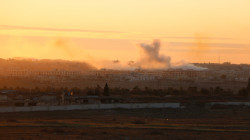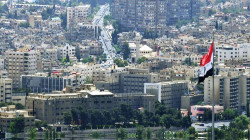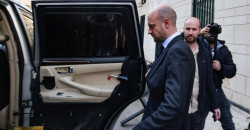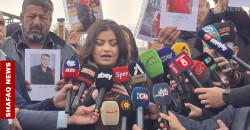"The Assad Regime Would Not Survive Loss of Captagon Revenues"- DS report
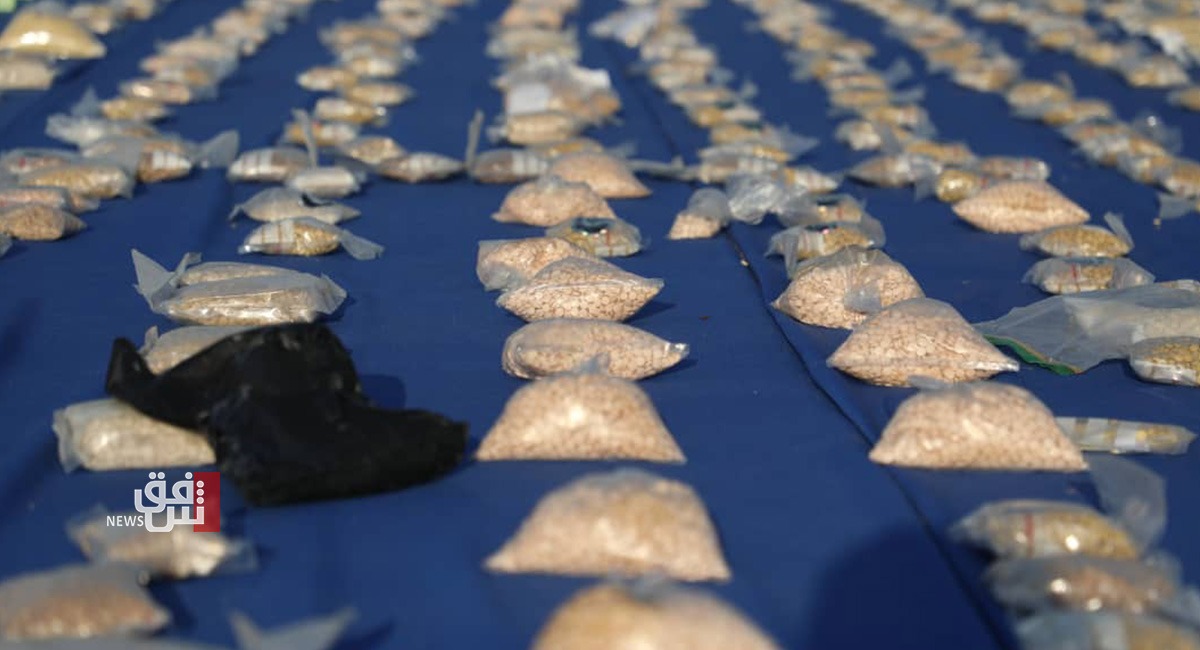
Shafaq News / The whole thing started by chance, as is so often the case. Inside a cargo container bearing the number ARKU 837499-1, loaded with Thermo King-brand refrigeration units, Romanian customs officials in April 2020 found merchandise that was far more intriguing than the bill of lading might indicate. Hidden inside the appliances were 2.1 million Captagon pills with amphetamine content of 11.5 percent and a street value of 43.5 million euros. But where did the drugs come from?
The papers from the shipment, which was on its way from Syria to Saudi Arabia via Romania, were a start. The information they contained led to the tapping of telephones and the monitoring of suspicious conversations. Slowly, a group seemed to emerge, with a person named "Abu Fouad" as its leader. The investigators were extremely interested in what Abu Fouad and his accomplices had to say: When they spoke of "milk," they likely meant cocaine. "Autos" or "things” referred to other drugs. It wasn't always easy to follow the men's conversations, and they only rarely spoke on the phone anyway. But it wasn't completely impossible.
Slowly, it became clear that Abu Fouad, the chief logistician for the drug dealers, was the extremely well networked Iyad C., aged 55. C. is from the Syrian city of Latakia, where he ran an import-export company at the port before the Fourth Division, an elite military unit belonging to the regime of Syrian dictator Bashar Assad, closed down his business at some point in 2017 and took over. Since then, he has been living abroad: sometimes in Turkey, sometimes in Lebanon and, every now and then, in the southwestern German city of Speyer, where his family fled to in 2015. He apparently took over control of the sensitive freight as soon as the containers had set sail from Latakia. And he had extremely powerful backers.
If prosecutors can prove in court what investigators from the German state of North Rhine-Westphalia claim to have discovered after a multiyear effort, the crime history books in Germany will receive a significant new chapter. What initially looked like just another case involving a drug gang has since developed into a political web of intrigue – with the Assad clan right at the center.
A suspicion has crystallized that the regime in Damascus generates a significant portion of its revenues through international sales of the amphetamine Captagon, which is especially popular in Arab countries. In addition to Iyad C., two other Syrians and an Algerian have been indicted in Germany, with their trial set to begin soon in Essen, Germany. It is expected that the court proceedings will shine a spotlight on a booming drug trade under the control of the Syrian dictatorship.
In recent years, security officials have repeatedly been able to intercept gigantic shipments of Captagon. On a single day – July 1, 2020 – fully 84 million pills were confiscated in the port of Salerno, Italy, with a street value of around a billion euros. The previous July, Greek officials confiscated 5.25 tons of Captagon. In April 2020, Egyptian customs officials in Port Said found both Captagon and hashish, packed in 19,000 Tetra Pak containers from the Syrian company Milkman, which was owned at the time by Bashar Assad's wealthiest cousin Rami Makhlouf, who would later fall into disfavor. Makhlouf denied at the time that his company was involved.
In November 2021, the Egyptians again stumbled across Captagon, this time 11 million pills. In late March, it was Malaysia's turn, with fully 94.8 million Captagon pills showing up in Port Klang. There have been additional discoveries in Lebanon, Hong Kong and Nigeria along with numerous confiscations at ports in Dubai and Saudi Arabia.
Syria, it would seem, has transformed into a Mediterranean narco-state. For the economically downtrodden and still largely destroyed rump state under the leadership of Assad, the Captagon business has become its most important export, says Joel Rayburn, the former U.S. special envoy for Syria. "I believe the Assad regime would not survive the loss of the Captagon revenues," he says. And it's not like the Syrian regime merely stands aside to allow the ongoing production and export of the drugs, he says. "They are the cartel."
It has consistently looked as though the producers in Syria were able to easily withstand the setbacks they have suffered – as though they produce such vast quantities of the drug that even immense seizures have hardly left a dent. And thus far, it has proven impossible to link those behind the mega deals with concrete deliveries. But the case in Essen could now change that.
The investigating prosecutors in Essen and criminal investigators in North Rhine-Westphalia believe that Iyad C. is at the heart of the cartel. They have been able to link more than a ton of hashish and more than a ton of Captagon to Iyad C. and his people – with a street value of around 130 million euros.
Investigating officials have also been able to sketch out the structure of the deals, which involves backers in Syria controlling the Captagon trade with the help of logistics experts who previously fled to Europe. "They send out one shipment after the next," says one investigator.
Among Iyad C.'s suspected accomplices is fellow Syrian Mohamad B., a hulking brute of almost 2 meters in height who lives in Germany's Ruhr Valley. He is thought to have been involved in drug smuggling in Syria even before he fled to Germany. According to the indictment, he stood in such good stead with people from the Assad clan that he was able to live in one of the best neighborhoods in Damascus. At least until he apparently cheated his business partners and had to flee. Lawyers for the defendants declined to discuss the case when approached for comment.
The cartel surrounding Iyad C. is believed to have operated as an extension of the Syrian regime, in part based on evidence dug up by investigators that two of the four men have in the past held influential posts at the port of Latakia. In addition, all of the group's shipments have originated from that port – and despite cargo being intercepted and confiscated on several occasions, additional shipments have continually been shipped out, indicating a significant production capacity. The suspected accomplice Mohamad B. could also be heard bragging in an intercepted phone conversation about his ongoing excellent ties to members of the Assad clan, even saying they were his friends.
The investigators, in short, are convinced that all of the drug deals in Syria are under the protection of the Assad regime. They have found proof that the Fourth Army Division, under the leadership of the president's brother Maher Assad, also earns money from the drug shipments. They believe that the unit is paid $300,000 for every container shipped out of Latakia, with another $60,000 presumably paid to soldiers so that they don't take their monitoring duties too seriously. Maher Assad didn't respond to several attempts to contact him.
The pills are disguised as legal products for shipment – things like rubber tires, steel cogwheels or industrial paper rolls. Other times, it is sofas or even plastic fruit. Almost always, though, the shipments come out of the northern port of Latakia, which has been under the Assad family's control since the 1980s.
It is a gigantic business, even if one only looks at the value of the Captagon that has been intercepted. A conservative estimate from the Washington-based think tank New Lines Institute holds that the total value of the shipments amounted to at least $5.7 billion in 2021, several times higher than Syria's legal exports, which added up to a paltry $860 million in 2020. And nobody knows how much of the product actually reaches its destination. Western think tanks and intelligence agencies estimate that total profits are in the two-digit billions.
On the strength of investigative reports, witness testimony and discussions with drug investigators over the course of several months, DER SPIEGEL and the Italian daily La Repubblica have been able to paint a picture of a regime that only has limited control of its own criminal networks. Assad's cousins, the Hezbollah and local mafia bosses have established mini empires that occasionally clash.
But when it comes to transportation, the name Maher Assad, the president’s younger brother and the commander of the Fourth Division, repeatedly comes up. The division, investigators believe, has transformed in recent years into a kind of mafia conglomerate with a military wing, guarding shipments and factories in addition to controlling ports. And cashing in. Maher's deputy, General Ghassan Bilal, is thought to be the head of operations and the liaison to the Hezbollah.
Bashar Assad may be the country's absolutist leader, but the loyalty of powerful warlords, business leaders and even his own relatives comes at a price. The men behind the case going on trial in Essen also worked with the Assad family, but on their own behalf, according to an informant from the Christian city of Saydnaya, from which several of the group's leaders come. "They used to be a gang engaged in petty crime," he says. They're called Al-Hout, or the "Whale Gang," he says, adding that he doesn't know where the name comes from. Most importantly, they are Christians. "When the war broke out, Assad wanted to keep Saydnaya and the Christians on his side no matter what." So, he gave the gang members a free hand to prey on other businessmen, like the ones who had fled from the prosperous suburbs of Damascus.
For years, the informant said, they lived off of plundering and blackmailing, but eventually, those sources of income dried up. Captagon presented itself as an excellent new source of revenues. The informant says they now produce pills at eight sites between Saydnaya and the town of Rankous, located near the Lebanese border.
Captagon is an amphetamine that is just as popular among the bored Gulf kids who party through the night as it is with terror forces and other militia in the Middle East and Africa who want to feel invincible. The lion's share of the pills, which are referred to as "two moons" or "Lexus" on the street, is sold in Saudi Arabia and other Gulf nations for up to $32 a pill. According to an estimate from a team of investigative psychopharmacologists, up to 40 percent of young drug users in Saudi Arabia now take Captagon.
In Europe, where huge amounts of the pills have been confiscated on several different occasions, Captagon isn't nearly as popular. Italian and German drug investigators say they were rather surprised at the finds early on, wondering where they were destined for.
Investigations, though, have revealed that the detour the drugs take through Europe is part of the plan, aimed at deceiving customs officials in Saudi Arabia and Dubai. Once in Europe, they are repacked and sent back southward to the Gulf. "Containers that come directly from Latakia are immediately dismantled by the Saudis, down to the last screw," says an investigator with Italy’s Guardia di Finanza police. "But containers from Europe with machine parts and rolls of paper? They hardly ever examine those."
Lebanese Hezbollah also took advantage of its logistical expertise gained through the export of hashish – which had been planted in the Beqaa Valley for decades under the group’s oversight – to enter the pill market. The militia's high-level business contacts came to light in October 2015, when Saudi Arabian Prince Abdul Muhsin bin Abdulaziz Al Saud was arrested at the Beirut airport just as he was set to take off in his private jet. On board the plane was a ton of Captagon. The prince had apparently had a falling out with his business partners. And vengeance was swift, as a Lebanese intelligence officer told the Guardian: "He was set up by the Hezbollah."
The militia's small drug production sites, which began popping up in large numbers in 2013, primarily in the area surrounding the western Syrian town of al-Qusayr that had been conquered by the militia's fighters, were just the beginning. In recent years, proper factories have sprung up, primarily in the surroundings of Latakia, Assad's hometown of Qardaha and in the Alawite section of Homs. They are operated by various Assad cousins and other regime acolytes.
In 2021, a businessman who has since fled Syria told DER SPIEGEL that he had visited one of the factories in Latakia. "They produce in industrial quantities," he said. "The entire compound is patrolled by armed guards." Because his parents are still in the country, he asked that we not describe the precise location of the factory and which Assad cousin operates it.
A former Syrian drug investigator, a regime militia commander and a watchman from the factory have confirmed its existence. But none want to risk exposing themselves to the long arm of Assad's vengeance and asked to remain anonymous.
For foreign investigators, Syria is essentially a black hole. It makes little sense to send requests for judicial assistance to a dictatorship where the ruling family controls the drug trade. As such, the full extent of Captagon production in Syria can only be guessed at. In 2020, the United Nations registered that Syria had imported fully 50 tons of an important basic ingredient for the production of Captagon. The chemical is called pseudoephedrine, which is used for prescription cold medicines, but also for the production of crystal meth. Fifty tons is more than half the amount imported by Switzerland, which has a massive pharmaceuticals industry.
It is unclear precisely which groups in Syria control the individual smuggling operations, but there are clues based on both the errors that have been made and the professional preparations that some of the shipments have exhibited. During the two-year North Rhine-Westphalia investigation, it has become clear that Hezbollah apparently plays no role in the shipments coming out of Latakia. Instead, the Assad cousins have apparently sought to establish their own distribution network – and have made a few beginner’s errors abroad, since they didn't have the same amount of experience as the Hezbollah.
Still, the cargo intercepted in Salerno surprised officials due to the quality of the concealment. "The rolls of paper were so huge that we never would have found the pills inside had we merely x-rayed them," says an Italian official. The rolls, he says, were clearly produced in a factory created for that purpose, a conclusion reached through an examination of some tears that had been repaired.
The shipment also included a phony machine that was several meters long and made using huge cogwheels. It was likely assembled from parts from the driveshaft of a scrapped ship, which were then newly painted and even labeled "trasmissioni meccaniche" and stamped with the logo of the Italian mechanical engineering company Fusetti. "Everything was made to look as though the containers had come straight from Italy," says the official. From Salerno, the freight was supposed to be sent onward to Athens and then back to the Arabian region. The standard route.
But then came the coronavirus. The first shipment from Latakia arrived on April 12, 2020, but because port operations had ceased, it could not be sent onwards. The second shipment reached the port on April 15. For weeks, nothing happened, but then, a Camorra spy notified the police about the first container. "They likely got wind of the fact that somebody wanted to smuggle drugs through their territory," says an Italian investigator.
The informant had spoken to the police of hashish, 2.8 tons of which were discovered, hidden among used clothing. But they also found 190 kilograms of Captagon – a beloved combination of the Syrian dealers. "After that, another official went through all container bookings made over the course of several weeks to see if additional shipments had been booked along the same route by the same agents," the investigator from Naples says. "That’s how we found the second shipment. The 14 tons. The jackpot."
The officials in Salerno and Naples were surprised by the combination of perfect preparations made in Syria and the rather amateurish logistics in Europe – including a plan that completely lost sight of the fact that container processing in Salerno had been suspended because of the coronavirus pandemic.
But not even the vast confiscation of Captagon pills in Salerno seemed to be much of a problem for the Syrian cartel. Just two months later, Romanian investigators discovered 4 million Captagon pills in the port of Constanţa, hidden in olive soap. And ever since officials in Europe have become suspicious of all shipments originating in Latakia, growing amounts of Captagon are being smuggled overland via Iraq and Jordan. Border guards there regularly engage in firefights with couriers. On Jan. 26, 2022, fully 27 Syrian smugglers were shot dead, with many more injured, when they tried to take advantage of a snowstorm to cross the border into Jordan.
(Der Spiegel)
